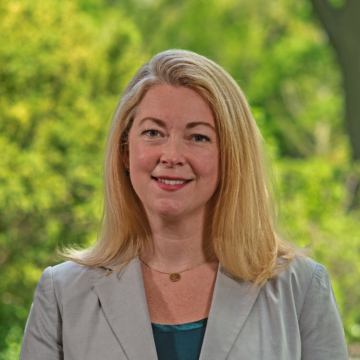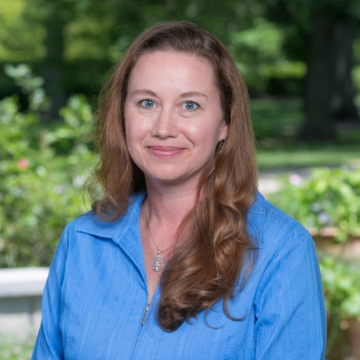As director of The Morton Arboretum’s Center for Tree Science, Meghan Midgley leads a team of accomplished tree scientists. As the leader of the Soil Ecology research group, she investigates how interactions among plants, microbes, and soil influence ecosystem responses to environmental changes.
The Center for Tree Science is the hub for the Arboretum’s work in tree science. As its director, Midgley leads more than 30 researchers who collaborate with colleagues around the world to advance and share knowledge of trees and their ecosystems to address the impacts of climate change and biodiversity loss. The center builds scientific networks and shares research resources to develop new solutions to the challenges facing trees, while mentoring the next generation of leaders in tree science.
Midgley also is a soil and ecosystem ecologist who focuses on plant-soil interactions. Her research has two overarching themes: relationships between plant traits and ecosystem functions and the above- and belowground consequences of human activities. She investigates these topics using field experiments and field observations as well as laboratory and greenhouse studies, with a particular focus on temperate ecosystems.
Her research goal is to translate ecological understanding of plant-soil interactions into effective techniques for restoring and managing natural and urban ecosystems.
As a student, Midgley focused on human-environment interactions by examining the social context of canyon restoration in San Diego and the drivers of reforestation in Indiana. She then pursued a doctorate in biology, studying how a pervasive environmental change–increased nitrogen deposition–altered forest ecosystem structure and functioning, in order to gain a deeper understanding of the ecological processes driving restoration and reforestation trajectories. These experiences solidified her desire and ability to generate collaborative, community-oriented, and scientifically-sound solutions to environmental problems.
In her role as the Arboretum’s soil ecologist, Midgley has developed basic and applied research projects with colleagues across urban and wildland ecosystems. She continues to study fundamental relationships between plants and soil. She is applying these insights to enhance tallgrass prairie and oak ecosystem restoration, predict environmental change effects on trees and ecosystems, and improve urban soils for trees. Her research is fundamentally predictive, mechanistic, and practical. She broadly disseminates her findings to the academic, restoration, and arboriculture communities. As a soil enthusiast, she hopes to inspire others to appreciate the role of the belowground environment in meeting aboveground goals.



